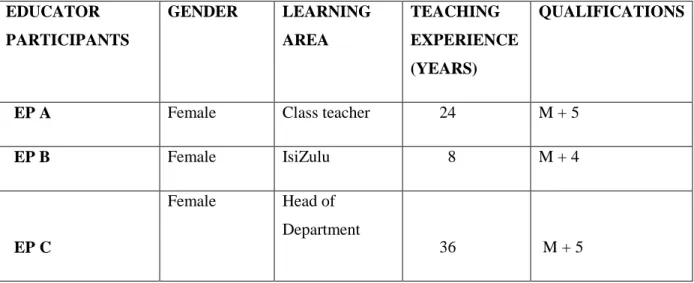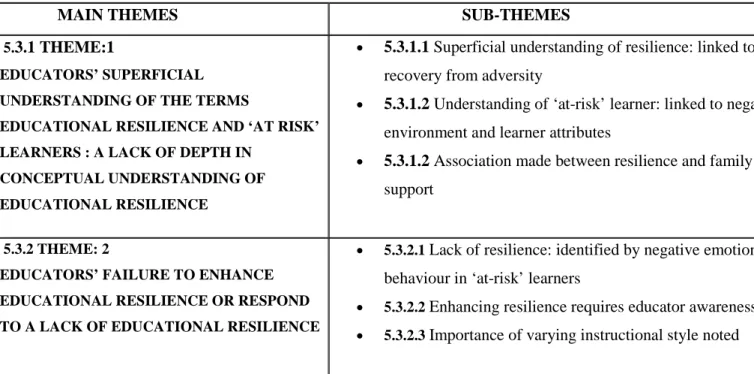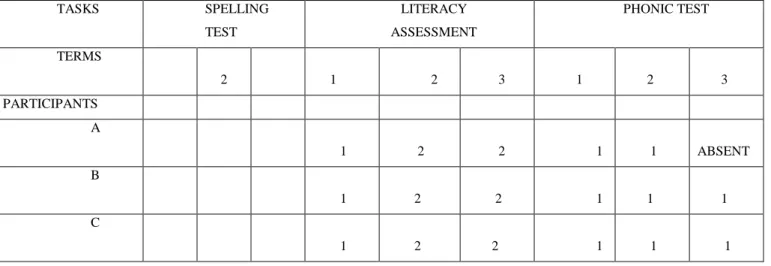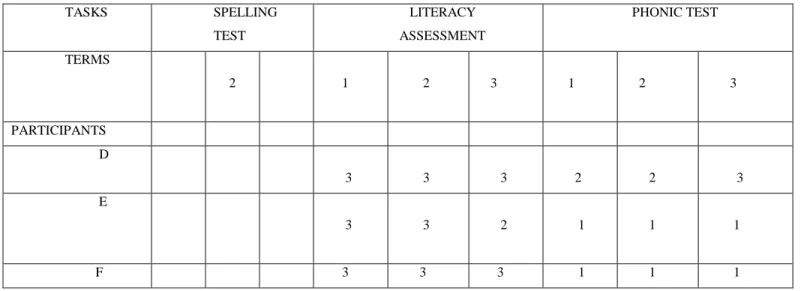To my supervisor, Dr. Rosemary Kalenga, thank you for your time, guidance, support and encouragement in enabling me to complete this research. To my siblings and Vanessa and Jessica Moodley, thank you for your support and encouragement.
Introduction
Researchers Nettles et al, (2000) argued in their study 'understanding resilience' that the academic performance of 'at-risk' students will benefit positively from access to caring teachers who provide a supportive relationship; educators can effectively enable learners to be less vulnerable to their circumstances and develop resilience against factors beyond their control (Russo & Boman, 2007, p. 18). It goes without saying that educators in order to promote educational resilience in learners in their care will have to have sufficient insight into the concept to recognize it in their learners and potentiate it in the classroom.
Background to the Study
Building educational resilience in the school environment plays a significant role in improving academic outcomes in the vulnerable. First World countries have established intervention programs that improve educational resilience in at-risk learners that can be easily accessed or adapted for South African educators to use in their classrooms.
Rationale for the Study
I felt that this study could highlight the importance of educational resilience in the foundation phase and create an interest in the topic among other educators. The research questions were constructed to explore foundation phase educators' insight into educational resilience in a South African primary school and to gain a contextual understanding of educational resilience as it applied to foundation phase education.
Literature Review
Educational resilience for the purpose of this study was defined as the increased likelihood of academic success despite environmental adversity (Fraser, 2004, p. 143). Due to the breadth of the field of study of educational sustainability and the complexity of the variables, applicable definitions of educational sustainability are highlighted below.
Research Questions
In the original proposal for the study, an open questionnaire was part of the study design. APPENDIX: AUDIT TRACKING PROCESS FOR THE INDUCTIVE PROCESS FOLLOWED IN CODING DATA.

Aim of Study
Theoretical Framework
INSIGHT: This refers to a clear and deep perception of the complex nature of a concept, based on the ability to understand it through knowledge or skills (Webster's Revised Dictionary). To make research on this topic relevant and significant, theoretical constructs were used to determine various aspects of the research design.
Research Study Design
Research Methodology
Maree (2007) encouraged the use of more than one method of data collection to increase the validity of findings. This was done to allow the educator participants to reflect on their views on educational resilience away from peer pressure in a focus group interview; the same questions presented in focus.
Data Analysis
The final aspect of data collection included assessment data of student participants identified by educator participants as resistant or non-resistant. Cohen et al, (2007) commented that qualitative data analysis involved organizing, calculating and explaining data in terms of participants' definitions of situations, patterns, themes and categories.
Scientific Rigor of the Study Design
This research study used the following instruments to ensure the reliability of the study results: questionnaires, classroom observation, focus group interview and document analysis. Information from the focus group interviews was also coded, sub-coded and categorized before common themes were identified.
Ethical Considerations
Parents of third-grade students and parents of six students who were identified as resilient and non-resilient by the third-grade teacher were also informed in writing; Written informed consent was sought for their children's participation in the study. All participants were given a pseudonym to protect their true identity and the identity of the school was also kept confidential.
Chapter Outline
Three students whose parents did not return consent forms and who were not available by phone on the date of the classroom observations were assured by me and their classroom teacher that another third-grade teacher would teach them for one lesson. At the conclusion of the study, all data collected during the research study will be retained at the University of KwaZulu-Natal for five years in the event that the study is withdrawn and substantial evidence is required to validate the data.
Conclusion
Introduction
The South African Perspective
Historical Context
Foundational Studies in Educational Resilience
However, some disadvantaged children were capable and did not show any behavioral problems. Waxman et al. (2004) cited a longitudinal study by Masten and Garmezy (1990) investigating factors attributed to the successful and unsuccessful development of Minnesota children considered to be.
The Resilient Child
This study compared three groups of children: competent children who grew up with little adversity, resilient children who grew up with a lot of adversity, and maladjusted children who had not overcome their adversity. The results of this study indicated that resilient children and competent children had a history of having more resources and support that helped them cope with adversity.
Non-Resilience: A Developmental Process
Rutter (2001) viewed the resilient child as coping with stress in a way that allowed for increased self-confidence and social competence. Lessons learned can help develop interventions with those who remain vulnerable or non-resilient.
Relevant factors in educational Resilience
In an attempt to reduce the effects of adverse circumstances and build resilience, researchers have identified a number of "protective factors" that promote development (Russo and Boman, 2007, p. 17). Russo and Boman (2007) believe that the educator can develop these protective factors through his interaction with students.
A Resilience-Based Approach to Educational Outcome
Strategies that use educational resilience as a tool to improve academic success through effective educational interventions should consider the 'modifiable' factors that promote resilience (Waxman et al, 2004, p. 38). Although many international studies have been conducted on resilience, few have examined resilience in schools; the following paragraphs will highlight the benefits of these studies (Waxman et al, 2004, p. 42).
Current Educational Resiliency Research
The findings of this study indicated that, in general, resilient students perceived their classrooms much more favorably than non-resistant students. The responses of the teachers in this study indicated that they had no difficulty in identifying resilient and non-resilient students in their class.
Educators’ Recognition of Educational Resilience
The above study supports the premise that in order for educators to successfully improve outcomes for students who are “at risk” for academic failure, instructional strategies must also be modified to adapt to student needs. These few studies examined teaching strategies that educators could use to gain knowledge about how to implement pedagogical resilience to teach students at 'risk' of academic failure.
Educators’ Understanding of Educational Resilience
The solution to this dilemma is that educators must be provided with a clear explanation of the educational resilience paradigm. Educators should be exposed to the literature on resilience to enable them to understand the concept and effectively administer programs that promote educational resilience in their classrooms.
Educators’ Enhancing Resilience
Findings were that teachers who attended the 'Other 3Rs' training compared to standard teacher training expressed greater perceived self-efficacy in their ability to influence children's learning, had greater confidence in their ability to help children use reasoning skills to become more resilient learners and more socially responsible and had greater beliefs that resilience can be learned. Henley, Schweier, de Gara et al (2007) undertook a review of theories and practices relating to the dynamics of resilience and sport and play programmes, established to assist children and young people experiencing adversity in their lives.
The Educational Environment
Briggs, Johnson, Shepherd et al (2002) argued that if teachers were to provide supportive learning experiences for children to build resilience in the classroom, they needed to be educated and well informed about the complexities. These researchers therefore argued that if educators were to provide supportive learning experiences for children "at risk" to build resilience in the classroom, then they needed to be educated on the applicable knowledge of resilience (Russo.
Conclusion
The resilience literature points to the importance of positive parent-child attachment; a caring relationship is associated with resilient children and this remains the child's primary social support. If family dynamics develop in a positive way, the effect on children and adolescents would be to improve resilient behavior (Olsson, CA, Bond, L., Burns, J. M., et al 2002, p. 7).
Introduction
The data collection took place in the actual cultural setting of the subject under study: the "field". I believed that the information from the secondary participants increased the reliability of the data collected from the educator participants.
The Ecological Perspective on Resilience
Bronfenbrenner’s Ecological Model
All attempts were made to prevent researcher bias in data analysis. The aim was to gain an understanding of the depth of insight of foundation stage teachers in a South African public primary school about educational resilience in the context of the 'at risk' learner.
Aspects of Werner & Smith’s Work in Resiliency Theory
Henderson & Milstein’s Resiliency Wheel
Ecological Theory interwoven with Resilience Theory
Contextual elements in the mesosystem, as described by the ecological model of Bronfenbrenner (1979) in Donald et al (2010), are relevant to this study as it explores the educational sustainability and outcomes of students 'at risk' of academic failure. The various elements in the Resilience Model (2000) when considered will allow the school environment to be structured in a way that fosters educational resilience in its students (Waxman et al, 2004, p.125).
Conclusion
It is obvious that in order to improve educational achievement, students and teachers must take the opportunity to form a positive relationship with each other because they are interconnected; considering resilience theory, the shared attributes that identify resilience in a child will allow the teacher to identify those students who are resilient and those who are not from the same 'at risk' demographic and structure classroom intervention programs or creates opportunities to improve the resilience of every child, especially the most vulnerable. By intertwining these three theories into a conceptual framework, I believe that teachers can obtain a model of educational resilience that can be translated into practical use in the classroom.
Introduction
Chapter four will describe the research design and methodology used in this interpretive qualitative study. To put this chapter in perspective, while Chapter One introduced the rationale for the study and Chapter Two provided an in-depth review of the literature applicable to the study of resilience, Chapter Three discussed the theoretical framework underpinning this study.
Research Design
Every effort has been made to reflect on my subjectivity and bias as a foundation stage educator in the same school and the limitations of the study. As a foundation phase educator 'on the ground' I was able to immerse myself in the activities and environment of the subjects under study.
Research Problem and Working Hypothesis
By comparing different data collection methods and sources reliability, transferability, reliability and confirmability were increased. An in-depth description of the data analysis process will be discussed later in the text when issues related to reliability, transferability, reliability and confirmability of the findings will also be highlighted.
Research Questions
This was used to increase the depth of data collected and to validate the information gathered from the educator participants. Educator participants were able to identify resilient and non-resilient students within their 'at-risk' student demographic and conversely understood the risk factors associated with non-resilience.
Aims of the Study
Research Methodology
Using a case study approach for this study, multiple data collection techniques were used to explore the research topic. As a researcher, the case study approach enabled me to obtain a rich description of the experiences of educators and students in the classroom.
Research Site
The teacher did assist one of the non-resilient students who had limited understanding of the English language. The hypothesis at the start of the study was that teachers in the foundation phase did not have a deep understanding of educational resilience.
Population & Sampling
The Participants
Each participant was given a letter of participation for the study, which included a summary of the study. She was purposely chosen because of her expertise as a foundation phase leader.
The Data Collection Process
During the focus group interview, teacher participants indicated that the language barrier was one of the reasons for the lack of resilience among students identified as being at risk of academic failure. This was interpreted as evidence of the relatively superficial insight that educational participants had about the concept of pedagogical robustness.

Reliability & Validity
Data Analysis
The data from the focus group discussion were then coded and prepared for the next stage. The final level of the coding process involves a final pass through the data; this is known as selective data encoding (Neuman, 2006, p. 460).
Transcription
Using codes from the open coding level, I looked for codes that were connected and connected so that categories could be developed into themes from the data. Data from questionnaires, focus group interviews, observations and documents were analyzed by comparing and finding common patterns and themes.
Ethical Considerations
The parents of the Grade 3 students were also informed and written consent for their participation was obtained (Appendix F). Participants in this study were given a clear explanation and rationale for the study, and researcher-participant confidentiality was respected.
Conclusion
The students were informed about the study and verbally and in writing consented to the review of their work and my presence in class as an observer. The three students whose written parental consent was not available at the time of the classroom observation were not at risk in any way, as discussed elsewhere in the text.
Introduction
The term 'at risk' is used in the literature to describe children who have experienced adverse circumstances in their lives (cf. 2.8.1). It should be taken into account that the education participants had no formal training in resilience in education and that only two classroom observations took place in the study.

The Data Analyses
Main Themes and Sub-themes
This was attributed to a lack of theoretical knowledge of the factors that protect learners in the classroom and lent support to the finding that the foundation phase educator participants' level of insight into educational resilience was superficial. In this study, educator participants were aware of the lack of parental involvement in the lives of learners who were non-resilient, but were unaware of the potential protective nature of their role.
Discussion of Findings
It is therefore fair to conclude that educator participants in this study had a superficial understanding of the theory and practical application of educational resilience. In this study, although educator participants were aware of the lack of parental involvement in the lives of learners who were non-resilient, their awareness did not extend to their own role.
Conclusion
Educator professional development is a fundamental component that is a shared responsibility between the educator, the management team of the school and the training institutions of the Department of Education. All educators at pre- or in-service level must be equipped with the theoretical framework and practical understanding of the concept of educational resilience.
Introduction
The purpose of this study was to explore the depth of insight of educators as reflected in their ability to identify, understand, and increase the resilience of the students in their care. This chapter begins with a systematic summary, followed by a list of recommendations derived from the study's important findings.
Systematic summary of the study
They were able to describe negative attributes of the non-resilient child, but were unable to identify protective factors or strengths. Educators' understanding of the complex multisystemic factors influencing educational resilience was limited; participants were able to identify the role of parents and the role of adversity in resilience, but were not aware of their role as educators.
Recommendations
Workshops should be organized for teachers who show interest in the subject and take the initiative to involve students because they want to make a difference in the classroom. The international trend towards a systemic approach to understanding educational resilience establishes the role of all components in the school environment, and not just the educator, who has the responsibility to increase the resilience of all students.
Limitations of the Study
Research Topic: An Exploration of Insight of Foundation Phase Educators in Educational Resilience in a South African Public Primary School. Question: 5 How do you as foundation phase teachers increase the resilience of students "at risk" of academic failure.

Future Research Opportunities
Conclusion
Researching the resilience of young people living in an at-risk community, presented in partial fulfillment of the conditions for a master's degree. I want to reassure you with the following: - From the results of the research it will not be possible to identify any student or teacher in any way;.
Observation Schedule
Non-resilient students are quiet, introverted, lack motivation and do not want to work. Question: Do teachers increase the resilience of students at risk of failing in school, and how will they do this?


